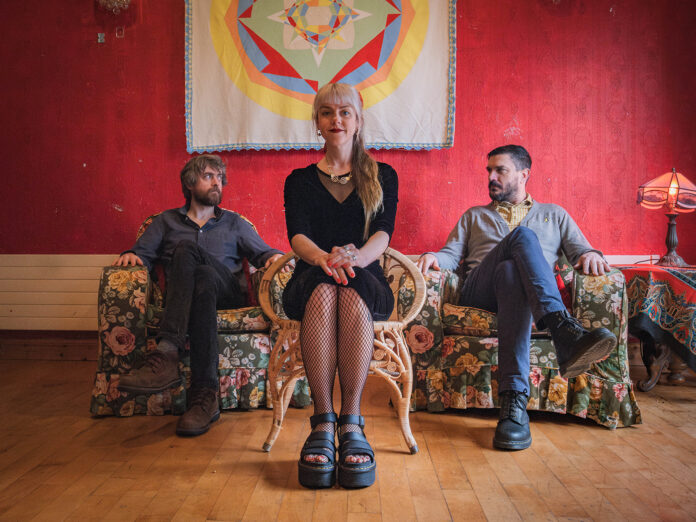The great success of Lankum, and their producer John “Spud” Murphy’s ubiquity across the sonically radicalised new Irish trad scene, can make it seem as if Ye Vagabonds, ØXN, John Francis Flynn and co comprise an essentially single entity, passing through Murphy’s studios for ocean-deep overdubs as centuries of lyrical heritage are challenged and channelled through doomy, bestial drones.
The great success of Lankum, and their producer John “Spud” Murphy’s ubiquity across the sonically radicalised new Irish trad scene, can make it seem as if Ye Vagabonds, ØXN, John Francis Flynn and co comprise an essentially single entity, passing through Murphy’s studios for ocean-deep overdubs as centuries of lyrical heritage are challenged and channelled through doomy, bestial drones.
The contrast between Lankum’s often thunderously heavy yet beautifully textured albums and Landless’s more sparely arranged harmonies, though, shows Murphy’s careful attentiveness to each distinct talent. Lankum’s Cormac MacDiarmada provided trademark string drones on Landless’s Lúireach (2024), and he and Landless’s Ruth Clinton are romantic partners, these days living away from Dublin in northwest Ireland. Alongside Lankum’s touring drummer John Dermody, their debut as Poor Creature sees Murphy characteristically knee-deep in its arrangements.
The tenderness of the band’s name is reflected in their music, and the greater sense of space they require makes All Smiles Tonight an airier, optimistic contribution to Ireland’s new wave, despite trad songs haunted by limbo and loss. MacDiarmada and Clinton’s love of country music also results in covers of the Louvin Brothers’ “Lorene” and Irish country stars Ray Lynam & Philomena Begley’s “The Whole Town Knows”. Clinton, meanwhile, brings Landless’s vocal focus with her, as she explores sometimes incantatory rhythms, framed by Murphy in vast echoing chambers and intimate close-up.
Poor Creature inadvertently began in the first Covid lockdown, when a Zoom session brought Clinton and MacDiarmada’s friends poignantly if remotely together, and one sang the old love song “An Draighneán Donn”. “We had a laptop and phone open as well and there was a time-lag between the two,” Clinton recalls, “an overlap which Cormac recorded.” This gave a clue to new musical possibilities, earthed in a contemporary sadness which folk songs stood ready to address. In All Smiles Tonight’s “An Draighneán Donn”, the lyric mourning a migrating lover “going far away ’cross the foam” has this separation embodied by time-lagged, layered vocals. MacDiarmada’s viola drone and fiddle also faultily align, as if across a stuttering transmission in the cosmic beyond suggested by Murphy’s cavernous echo, climaxing in huge, sustained organ notes (incredibly, from an ’80s keytar). As the ballad’s mournful lyrics compress and scatter in the production’s heady, heavenly atmosphere, the massed vocal sound suggests the community felt in that original Zoom call, as the music ascends.
“Adieu Lovely Eireann” sits at one extreme of All Smiles Tonight’s approach, as Clinton’s voice is all but submerged beneath a seam of strings, while Dermody’s pounding drums add to a ravey organ’s descent. Seek out the words sunk in this sea of sound, and the story of 19th-century forger William Hill, here a romantic rogue deported to Australia, aches with exile from beloved Ireland.
“Bury Me Not” sees a sailor’s desperate dying fear of burial at sea cruelly ignored, as guitar feedback resembles groaning sea-beasts. Clinton’s sorrowful voice sees him to his fate, singing with gentle prettiness as “around his head the sea snakes hiss”. This awful lyrical beauty shows the value of the traditional song-collecting at the root of this contemporary music, soaked up by its makers in singing sessions in Dublin and now Donegal and Fermanagh. “It could be a song you’ve known for years,” Clinton says. “You just have to hear the right person singing it, and it could change everything.” The unlucky sailor is also serenaded by Clinton’s theremin, here not wobbling exotica but a piercing, near human sound.
Poor Creature are equally adept at the simplicity which Landless explore. MacDiarmada’s voice is bereft as the Louvin Brothers’ sparely emotional words plunge through the heart of “Lorene”: “To stop me from hurting, all it would take is a letter from you.” His guitar marks his halting progress, verses stopping, suspended, notes individuated and lonely. The title track sees Clinton’s replaced lover putting on a brave face as MacDiarmada’s fiddle accompanies her towards a dance, Dermody giving her progress gallows momentum, until her voice grows defiantly huge.
Clinton greets the ghost lover returning from across an ocean and death’s borders to again share her bed on the closing “Willie-O” with unshaken grace. Her modest, narrative vocal provides the pure folk counterweight to Murphy’s maelstroms – once again to thrilling effect.
When you purchase through links on our site, we may earn an affiliate commission. Here’s how it works.



